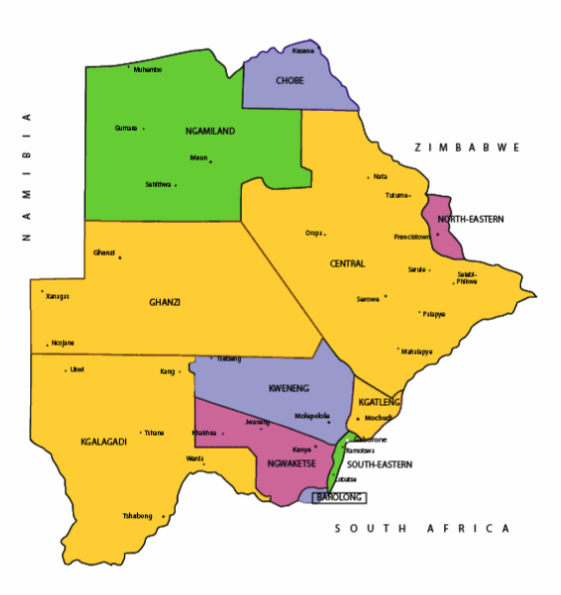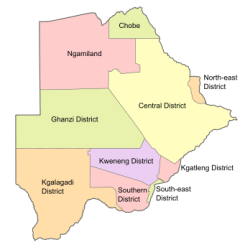Places and their polling stations in Jwaneng-Mabutsane, Botswana
436 Kokong-Morwamusu
2055 Kokong Primary School
2056 Kokong Kgotla
2057 Morwamosu Kgotla
437 Khakhea
2058 Molongwa JSS
2059 Khakhea Primary School
2060 Khakhea Kgotla
2061 Kutuku Primary School
2062 Itholoke Primary School
2063 Thari Mobile Health Stop
438 Mabutsane-Kanaku
2064 Mabutsane Primary School
2065 Mabutsane Community Hall
2066 Mabutsane Kgotla
2067 Kanaku Primary School
439 Sekoma
2068 Sekoma Primary School
2069 Sekoma Kgotla
2070 Keng Primary School
2071 Keng Kgotla
2072 Mahotshwane Primary School
2073 Mahotshwane Kgotla
2074 Khonkhwa Kgotla
440 Mokhomma
2075 Mokhomma Primary School
2076 Mokhomma Kgotla
2077 Samane Primary School
2078 Thankane Primary School
441 Sese
2079 Sese Primary School
2080 Sese Kgotla
2081 Sese Community Hall
2082 Kadue Mobile Health Stop
442 Masa A Sele
2083 Unit 7 Children’s Playground
2084 Open Space Next To Unit 7 Clinic
443 Ngami
2085 Morama JSS
2086 Teemane Primary School
444 Raphalane
2087 Unit 6 Children’s Playground
2088 Unit 6 Primary School Site (Plot 4350)
2089 Teemane Open Space (Plot 7142)
445 Molopo
2090 Unit 3 Children’s Playground
2091 Dinonyane Primary School
2092 Fire Brigade
446 Kgalagadi
2093 Unit 2 Children’s Playground
2094 Kgalagadi Primary School
447 Mogale
2095 Unit 5 Children’s Playground
2096 Multipurpose Hall
2097 Industrial Area Camp Open Space
448 Seole
2098 Jwana Primary School
2099 Technical College
Reference: iec.gov.bw/index.php/electoral-districts/polling-stations.html
Botswana
Botswana is a country in Africa. It is topographically flat, with approximately 70 percent of its territory being the Kalahari Desert.
It is bordered by South Africa to the south and southeast, Namibia to the west and north, and Zimbabwe to the northeast.
Capital: Gaborone
Currency: Botswanan Pula
Official language: English
Population: 2.588 million (2021) World Bank
Dialing code: +267
Gross Domestic Product: 17.61 billion USD (2021) World Bank
Botswana’s ten districts are:
- Southern District
- South-East District
- Kweneng District
- Kgatleng District
- Central District
- North-East District
- Ngamiland District
- Kgalagadi District
- Chobe District
- Ghanzi District
Botswana’s councils created from urban or town councils are: Gaborone City, Francistown, Lobatse Town, Selebi-Phikwe Town, Jwaneng Town, Orapa Town and Sowa Township.






The name Botswana refers to ‘Land of the Tswana’. The landlocked, Southern Africa country is officially known as the Republic of Botswana.














Botswana is connected to Zambia through the Kazungula Bridge making it the world’s shortest border between two countries.
A country of slightly over 2 million people (2021), Botswana is one of the most sparsely populated countries in the world. It is essentially the nation state of the Tswana ethnic group, who make up 79% of the population.

About 11.6 per cent of the population lives in the capital and largest city, Gaborone.
Formerly one of the world’s poorest countries—with a GDP per capita of about US$70 per year in the late 1960s—it has since transformed itself into an upper-middle-income country, with one of the world’s fastest-growing economies.


The Tswana ethnic group were descended mainly from Bantu-speaking tribes who migrated southward of Africa to modern Botswana, living in tribal enclaves as farmers and herders.




In 1885, the British colonised the area and declared a protectorate under the name of Bechuanaland.
As colonisation stopped, Bechuanaland became an independent republic under its current name on 30 September 1966.


Since then, it has been a representative republic, with a consistent record of uninterrupted democratic elections and the lowest perceived corruption ranking in Africa since at least 1998.

The economy is dominated by mining and tourism. Botswana has a GDP (purchasing power parity) per capita of about $18,113 as of 2021, one of the highest in subsaharan Africa.


Botswana is the world’s biggest diamond producing country.
Its relatively high gross national income per capita gives the country a high standard of living and the third-highest Human Development Index of continental Sub-Saharan Africa (after Gabon and South Africa).
The country has been adversely affected by the HIV/AIDS epidemic. In 2002, Botswana began offering anti-retroviral drugs (ARVs) to help combat the epidemic.
Botswana is a member of the Southern African Customs Union, the Southern African Development Community, the Commonwealth of Nations, and the United Nations.

